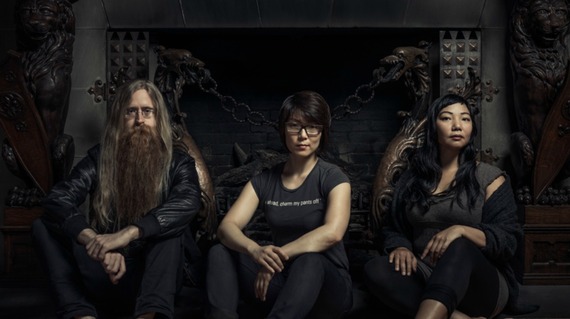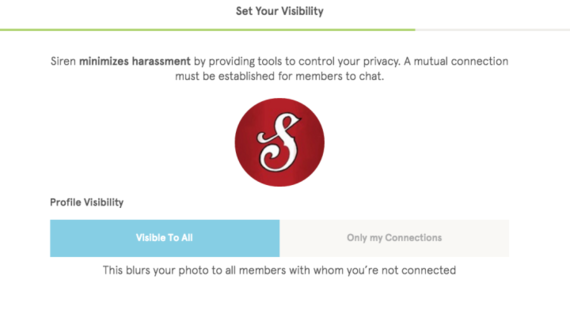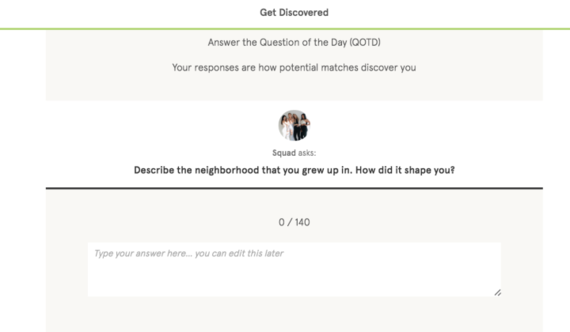What does it take to reinvent online dating, creating a space that's at once safe for participants of all gender identities and facilitates a continuous stream of successful matches?
In part, Siren dating app co-founder and CEO Susie Lee tells me over Skype, it's acknowledging that the pile of poop you're smelling is neither one you created nor one you are responsible for cleaning up.
The excrement is, in this case, metaphorical -- but that doesn't make it any less noxious than the real deal. Lee is referring to Silicon Valley and the broader entrepreneurial realm's abysmal gender diversity, her brushes with which have at times been odious.
Originally hailing from the art world, Lee is struck by the offensive double standards women face in the boardroom. Many of the male investors she approached about her vision for a new virtual dating paradigm were immediately dubious of her claims that women were looking to feel more secure with online options. They also openly doubted that she was the woman who could realize such a shift -- one exec said his first impression of her "was of a very tiny, very friendly woman" he "wanted to bat around" and whose friendliness "detracted from her credibility."
Lee, who identifies herself as a maker first and foremost, draws a stark comparison with her past in the art realm:
"It's as if I had gone into the art world, and every curator I'd met had gone 'Oh, yeah . . . you can't handle all these complicated installations because you're a woman'--I'd never had those conversations before."
Happily, Lee has continued creating undeterred, and her project Siren, one of the first dating apps founded and centered on women's needs and desires, is flourishing.
Long dissatisfied with the dating app landscape and frustrated by the lack of commitment to making women feel secure, Lee and Siren co-founder and COO Katrina Hess set out to create something totally different. Per the site's blog:
"As women, we knew that in order to allow ourselves to become vulnerable--to take a chance on the unknown--we first had to cultivate a community standard of safety, comfort, and trust. To address this need, SIREN created customizable privacy controls and a casual, conversational model of interaction that mimics how flirting happens in real life."
Siren, simply and ingeniously, allows women to control their own visibility. Users choose who gets to see their photos and when, exactly, they reveal them.
The evidence that this model fulfills a niche in the marketplace is significant. Launched nationally just two months ago, Siren currently has 9,500 members -- at a 53:47 female-to-male ratio across all ages -- and a pile of success stories (including a recent engagement). The app has also seen continuous growth and, astonishingly, hasn't fallen victim to the online hate machine. Lee elaborates:
"The one incredible thing that still holds is that we have had zero harassing messages from either men or women since the site's launch. They don't complain on social media, they don't complain on the app, they don't email us to say how shitty the app is."
This doesn't, however, reflect some of the feedback Lee received over the course of building the beta model and launching the app. A number of people told her Siren would never succeed, because men are the "natural pursuers," women are naturally the pursued and that, full stop, is "just how it works." She claims, though, that "the problem is that you've never offered people an alternative platform to see if that really is the case. When you only have one kind of model, that doesn't mean that's all people are capable of or wanting to use."
The team started out focusing on addressing the needs of heterosexual women, the realm they were most familiar with and one "in desperate need of new paradigms." In a world where articles like "I Swear I'm Not Trying To Scare The Crap Out Of You: 7 Tips For Safer Online Dating" abound, women being nervous about swiping and venturing out into the world to meet potential suitors is not a new notion.
But a less contemplated idea is how having to use a photo online can hold some women back from exploring for matches. Lee says:
"If you're someone who wants to show your picture off and roll with that, I say great. Those dating app models are out there. But for people looking for discretion, who don't feel that their boss, students, or clients need to know about their dating lives, that's a really huge number of people who will never join places like Tinder or Match or OKCupid or anything like that."
Concerning current online dating models, she goes on:
"What's out there is this horrible requirement of having to market yourself, often in ways that are false, to feel like you can 'compete.' It's all based on objectification, shopping, and rating each other. But if you want to meaningfully connect with someone on an intimate level, you're talking about vulnerability, about finding someone who will actually see you for you who are."
In addition to its innovative visibility settings, members on the app are also freed from the swipe-to-reject archetype, and instead get to know each other through a unique "Question of the Day" forum, with Seattle-based creative types offering up thought-provoking questions for people to bond and banter over. Different QOTD celebs -- local "artists, musicians, entrepreneurs, and thought-leaders" -- throw out contemplative brain fodder like "When was the last time your body surprised you?"
Members weigh in to answer -- and connect with one another when they see a response that has piqued their interest. Lee's goal with this model is to emulate "an awesome dinner party."
"Isn't that ideally the way we all want to meet somebody?" she asks me. "You don't come in with the agenda of 'Are you dating material? Are you my partner for life?' It's like, 'Hey, can I banter with you? Are you fun to talk to?' It's like unwrapping a multi-layered gift, as opposed to this huge yes or no thing."
By contrast, given that Siren's question of the day forum is so contextual, "humor and sincerity are much more prevalent" -- like the gentleman who masterfully responded to the query "If you knew you could do something and not fail, what would you do?" with "Rob a bank . . . Wait, am I doing this wrong?" Lee explains: "Because it's one question -- if you try to lie, you'll never know what the 'correct' answer is. You lying about your most recent Netflix binge gets you no further than you telling the truth. And people know that."
Members are also free to define themselves how they choose -- no occupation disclosure required. As a result, existing descriptions include glorious nuggets such as "closet rapper" and "unpublished author, unsigned musician, destroyer of software, dreamer."
And the app has just this week realized one of its other core goals: becoming more accessible to everyone. After some key hires, focus groups, consulting sessions with LGBT advisers, and a "whole lot of time listening," Siren launched its LGBT model on December 1.
Now you can select who, exactly, you want to be seen by. If you identify as "woman" or "non-binary" and are looking for connections with other women, you won't be seen by men or straight women. There's also a transgender option designed to maintain the security of trans members. Per the LGBT launch announcement blog post:
"One of the key tenets of SIREN is that identity is a story, not a constant. None of us are exactly the same person from day to day, which is why it's so exciting to reveal ourselves as a narrative over time rather than as a static, superficial profile. It is with this tenet in mind, particularly as it pertains to the fluidity of gender and sexual orientation that many of us experience over a lifetime, that we are confident that our conversational model has something unique and powerful to offer LGBTQ members."
Siren's main community is in its hometown of Seattle, but the app can be downloaded anywhere in the U.S. and Canada. Lee tells me, "We're asking people to be patient and to spread the word if they believe in our mission and model, because that's how a quality community grows."
Reflecting on her year-plus journey in the dating app realm, Lee says, "It's been interesting to try to counter and shape human behavior -- it's like, I know it's bonkers, but we're trying to make things more natural. And I know that online dating isn't natural, but there are ways to do it better, to nudge human behavior toward something more real."
In a world sorely lacking in a balance of voices and views -- and implicitly skeptical of a woman entrepreneur -- it hasn't been easy for Lee to stick to her vision. Life lessons she's picked up along the way, however, have helped her navigate the shoals of business innovation. Speaking of detractors who've judged her on her gender, her small stature, and her lack of a background as a founder -- and who've expressed a belief that heterosexual men would never use an app created by women -- Lee says:
"I'm in my 40s now, so things are different, but I know back in my 20s I would have been like, what am I doing wrong--why am I not being heard? Should I not be heard? But in my 40s, I'm like, 'That is your bullshit, man. I'm not going to play this ridiculous game. That steaming pile of crap over there, that's yours; it's not mine. I have to walk around it, I have to smell it, but it's not mine so don't put it on my lap.'"
When we're done connecting on Siren, perhaps we could all take a cue from Lee's lead.
This piece originally appeared on The Establishment.
Other recent stories there include:
Dear Fragile Men: I Don't Give A Shit If You Hate My Sex Writing



